Translations 677
Continuing on the road of joy, trust and hope
 Together, we must continue on the road of joy, trust and hope.
Together, we must continue on the road of joy, trust and hope.
By Díaz-Canel in Havana
October 16, 2021
Translated and edited by Walter Lippmann for CubaNews
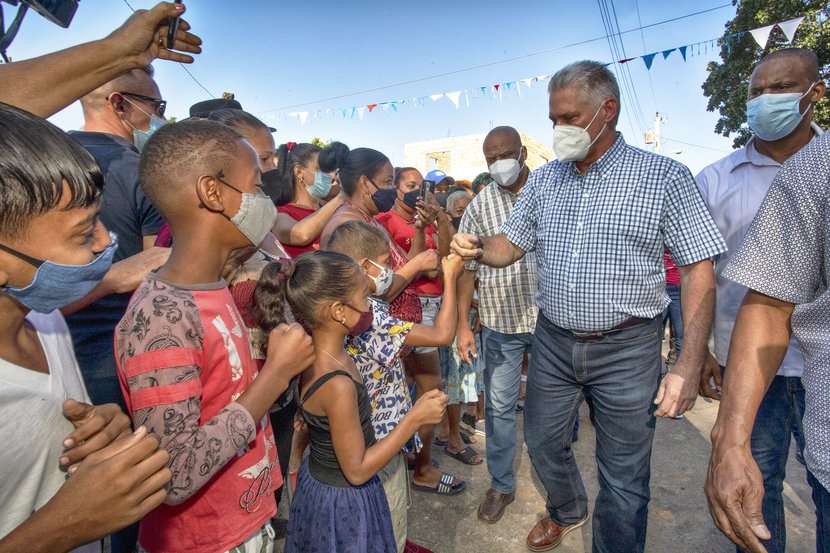
Havana, Oct. 16 – “Do not stand still. Everyone should always be doing something”. In these words dwells the philosophy of breaking with all immobility, of giving life a sense of creation and usefulness. The expression was made this Friday by the First Secretary of the Central Committee of the Communist Party and President of the Republic, Miguel Díaz-Canel Bermúdez, while visiting the La Corbata neighborhood of the Cubanacán People’s Council, in the capital’s Playa municipality.
There, as Usmany Lemagne Pagés -delegate, for the last four years, of the 80th popular district, called La Corbata- told us, the people’s mood is good since many actions have been undertaken, some of which have been noticeable for three years.
The delegate was born in that neighborhood: “In my youth, practically everything was made of wood”, he affirmed; and then he shared his joy because the neighborhood’s demands are getting solutions; because everything is paved; because new sidewalks have been built; because one fine day the medical office was ready to be able to vaccinate against the COVID-19; because the houses that the residents have been improving with their own effort and with the passing of the years are being legalized there.
Other good news will continue to make people talk about the neighborhood: there will be talk of its own winery -which the neighborhood never had-; cultural venues will be born; creations will continue to arrive to decorate the spaces -which will be added to those that Kcho (the plastic artist, Alexis Leiva Machado) has been donating-; the cobblestone parks will have an encouraging presence; small vortexes from which it is produced -those that will be not far from the carpentry shop located in the neighborhood- will give employment to those who are disconnected from any work; and finally, life will flow according to the concerns and feelings of the residents.
What they are doing is first consulted with the people and then seen in the Municipal Assembly of People’s Power? Where do the children go to school? How are the vaccinations going? During his tour, the President asked the first secretary of the Municipal Committee of the Party in Playa, Cesar Hernandez Gonzalez. At some point, the dignitary shared an idea that is useful for other similar endeavors: “we have to do things well, with beauty, with quality; because, if not, instead of creating new satisfactions, we will be creating new problems”.
As he walked along an asphalt road leading to a construction site in Kcho, together with Party and Government authorities, and with representatives of several institutions -such as the Ministry of Tourism, which accompanies La Corbata in its changes and whose head, Juan Carlos García Granda, was present- Díaz-Canel Bermúdez was greeting the people: He touched with his fists the fists of the joyful men and women, he greeted the laughing and curious girls and boys -the same ones who improvised a dance for him, guided by choreographer Roclán González-. And he reached the end of the road, holding a little boy by the hand, who advanced naturally and perhaps someday he will tell of this Friday of rebirth.
WORDS ABOUT CREATIVE RESISTANCE
From the neighborhood in the municipality of Playa, the Cuban President went to the municipality of Old Havana, exactly to the Taxpayer Facilitation Office, which has been working in recent years to expedite the payment of the property tax, which the office collects by state mandate.
In this precinct that is part of the Historic Center “Smart City”, which is a local development project and that through a group of digital tools makes it possible for the population to carry out procedures or transfer disagreements, in person or virtually, the Head of State expressed to journalists a set of ideas based on a question alluding to what is being done in the neediest neighborhoods.
Every time we want to understand something, he said, about the work strategy in the neighborhoods, we have to look for references, antecedents, dissatisfactions, “we also have to find the motivations, the aspirations for which these things are being done”.
He then emphasized: “I think it is not fair to say that nothing has ever been done for the neighborhoods. I believe that the Revolution has constantly been doing things in the neighborhoods”. And on this point, he said that since its beginnings, the Revolution has been transforming communities that lived in total precariousness: “Later, with the Revolution, and with its progress, (…) new communities and new neighborhoods were created”.
The president recalled that then came “very difficult times, from which we have not yet recovered”; he brought up the special period. Those were times, he reasoned, that “caused limitations, caused breaks in progress, slowed down processes, and all that accumulation of problems, and the impossibility of having a faster solution, has reflected all these dissatisfactions that exist in an important part of the population, those reflected in Silvio’s documentary (entitled Canción de barrio), those that we have been appreciating in all these years”.
The First Secretary of the Central Committee of the Communist Party made reference to “the need to strengthen in a more creative way our concept of popular power, which as a democratic and participatory exercise gives us the strength to make a much more participatory management. But we have to know how to do it, we have to drink in the history of how popular power arose, and we have to try to universalize it in the whole social context”.
He did not ignore in his words that in the recent exchanges that the country’s leadership has held with various sectors of society, not only dissatisfactions related to what happens in the neighborhoods have surfaced, but also with the ways of doing, those that are missing to change, to enhance the best. “Sensitivity -he stressed- moved us all to the fact that we had to go to a different moment, to a moment in which (…) we had to break with a routine (…)”, and this, he said, has been a catalyst that should lead to the sustainability of the work in the neighborhoods.
The Head of State spoke of organizations that, due to their potentialities, help in the neighborhoods -which does not mean intervening in those scenarios-; of “reaching the neighborhood, sharing with the neighborhood, letting the neighbors of that neighborhood tell us what their dissatisfactions are, what their aspirations are, and also letting them make proposals”, when he shared with reporters the approach that the country’s leadership is giving to the work in the communities.
It is a story, he reasoned, where people’s proposals are cardinal, because this way priorities are drawn at a time when resources are not enough to solve everything at once: Each idea – Diaz-Canel explained – is taken with the participation of the neighbors, through the delegate, to the Municipal Assembly of People’s Power, a space where then a balance of all the communities of the demarcation is made. Thus, he said, the actions are approved, and “through the Municipal Administration Council and the institutions, we work together”.
“How many things have we seen these weeks in the neighborhoods: places with sidewalks, which never had sidewalks; asphalted streets; problems with the water supply, solved; and of ditches and other elements that had to do with liquid waste; (…) beauty; new services appear in neighborhoods that never had services”.
This means, he reasoned, “a tremendous joy in the people, confidence and hope”. And all this, in a context of having lived “two intense years”, between aggressions, recrudescent blockade, and pandemic. In his opinion, it is very important that “this light arrives”, and that “the commitment that we cannot stop because we have to make this become a systematic, natural, genuine way of working, where everyone participates, where everyone can contribute”.
On the strength of participating, Diaz-Canel Bermudez said: “We have to see how people begin to defend their neighborhoods, how they begin to change their lives. I believe that what we have done is insufficient and is very far from everything we have to solve, but a path has already begun (…) and it is a path in which people are supporting us”.
There is a way, he reflected, to “consolidate our democracy, consolidate it from participation; participation in everything”: in the debate, he pointed out, in the possibility of making proposals, and in the implementation of those proposals; participation that guarantees popular control. “I believe that working in this way, in a few years we will also be making appreciable changes in the lives of our communities that need it so much, and with which we have a debt, not because we have not wanted to work, but because many adverse situations have come together.”
In the face of adversity, the President shared his certainty of how “creative thinking has arisen -I always say that resistance is not resisting, resisting by holding on: it is resisting creatively, and we have found solutions, we have found a way of doing (…) that is also opening up a perspective for us”.
The Head of State expressed his confidence in “everything that we can generate with this movement in the neighborhoods, and I hope that it will never fall into a routine, that it will be something natural, that it will be a necessity for our communities to work in this way”.
Regarding the path that has been started, he said: “This will also require that those who represent the people in these communities -their delegates, the public institutions- also, in interrelation with all the economic and social actors we have in the neighborhoods, are participating and giving a perspective of development, of progress to their communities; and this way we will all be happier, this way we will be working for all, with all, and for the good of all. In this way we will be very consistent with our Constitution, and we will also be very coherent with our economic and social strategy, with our Conceptualization. I believe that this is an integration of ideas and actions for the good of all”. (Presidency Cuba)
Creative resistance born in the neighborhoods

Cuba’s creative resistance is born in the neighborhoods (+Video)
“With the experience, with the motivations we have, with the encouragement for what we have achieved this year, what we are looking for is an innovation in community work, and an innovation in social work.” The reflection, made by the First Secretary of the Central Committee of the Communist Party and President of the Republic, Miguel Díaz-Canel Bermúdez, on Tuesday, marks the course of what the country has proposed to achieve from the actions in the most vulnerable neighborhoods.
Translated and edited by Walter Lippmann for CubaNews.
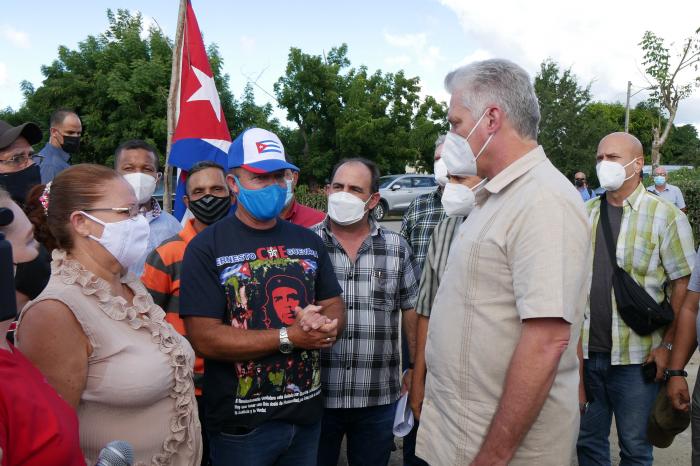
Díaz-Canel
The purpose has been to work together for the community. Photo: Estudios Revolución
“With the experience, with the motivations we have, with the encouragement for what we have achieved this year, what we are looking for is an innovation in community work, and an innovation in social work.” The reflection, made by the First Secretary of the Central Committee of the Communist Party and President of the Republic, Miguel Díaz-Canel Bermúdez, on Tuesday, marks the course of what the country has proposed to achieve through actions in the most vulnerable neighborhoods.
It is precisely the work in the neighborhoods where we find an expression of that concept of creative resistance that we have defended; because it is there in the neighborhoods where all the problems we have are manifested, emphasized the President at the meeting, which was also attended by members of the Political Bureau Salvador Valdés Mesa, Vice President of the Republic; and Roberto Morales Ojeda, Secretary of Organization and Politics of Cadres.
The pandemic manifested itself in the neighborhoods -commented the Head of State-, it is where the effects of the blockade and the measures of the US administration are suffered…. And there, our people have not only been able to resist, but when we summoned them and worked together, they have creatively solved a whole group of problems that in other times had remained unanswered, said the Head of State to representatives of several organizations and the highest leadership of the Party and the Government in the capital, together with whom he evaluated the most recent actions that have been carried out in the 67 Havana communities where they are currently working.
Since that participation, more than 9,500 constructive actions and almost 31,000 social actions have been carried out in the communities.
According to the information provided at the meeting by Havana Governor Reinaldo García Zapata, in these five months, the project has contributed to the improvement of the visual and architectural environment; to the rehabilitation of basic services, together with the installation of new services to the population; 101,128 tons of asphalt have been laid in the paving of 119 kilometers of roads and the construction of 72.1 kilometers of sidewalks; in addition, houses, citadels, buildings and stops have been rehabilitated and built. The more than 2,000 basic sanitation and Aguas de La Habana actions are among the actions that have had the greatest impact, he specified.
Progress has been made in the completion of community structures and factors; in the delivery of supply books; the legalization of housing; offers of job placement and continuity of studies; as well as attention to mothers with three or more children under 17 years of age.
Taking into account the way in which the work has been carried out in the different neighborhoods, García Zapata explained that out of the 67 in which they are working, 22 can conclude the year with the actions carried out in the municipalities of Arroyo Naranjo, Boyeros, Cerro, Cotorro, Guanabacoa, Habana Vieja, La Lisa, Playa, Regla and San Miguel.
At the same time, he proposed to the work team to include 40 new neighborhoods, and to maintain the ones started this year that have pending actions.
The national coordinator of the Committees for the Defense of the Revolution, Gerardo Hernández Nordelo, insisted on the priority that should be given to constant communication with the population, because many times the dissatisfactions are simply related to the lack of information that the inhabitants have about the actions being executed in their community.
And in that sense, he acknowledged, it is also vital the role that mass organizations can develop to explain about plans, work perspectives or lack of resources.
It is about working together for the community. This is the maxim that has prevailed in the neighborhoods and without which, considered the first secretary of the Provincial Committee of the Party, Luis Antonio Torres Iríbar, it would not have been possible to sustain all the actions that have been carried out in these months.
TAKING FULL ADVANTAGE OF THE POTENTIALITIES OF THE NEIGHBORHOODS
Creativity, participation, transformation have been key elements of all the efforts that have been made in the neighborhoods. And as part of the actions carried out there, the President of the Republic highlighted the way in which concepts such as popular power, developed by the Commander in Chief, have been defended; the improvement of democracy in our socialism with popular participation; the quality of everything that is done, because not in all places, he said, things have worked well or resources have been used as they should, as well as the sustainability of everything done, so that we always advance in the work in the neighborhoods and never go backwards.
Although we have been focused on making transformations, healing wounds that existed in the neighborhoods, recovering facilities and improving physical spaces, for 2022 we have the challenge of incorporating more subjectivity and more spirituality, the President reflected.
Knowing what the neighborhood has, what needs to be improved and what it lacks, is essential to be able to develop actions with greater precision in what is needed there, he added.
And if we treat all this from an emotional point of view, if we include a pedagogy and popular education that teaches those who lead how to work with the population and teach the population how to participate properly, we will undoubtedly be contributing to hope and to that transformation through participation, said Díaz-Canel.
Then, he reflected, the people will be seeing how from Socialism and how from the Revolution, with participation, they find meaning in their lives, because from Socialism, from the Revolution, with participation, they are transforming their lives, their individual lives, their family life, their social life, and therefore their community, which is where they carry out most of their activities.
In the search for this path, the Head of State considered it essential to carry out anthropological analysis and research of the neighborhoods, to know what their roots, motivations and aspirations are. He also emphasized that priority should be given to work with senior citizens and young people, two generations eager to contribute and do something.
He also drew attention to the contribution of making better use of the community projects that already exist and the experience of the leaders of these community projects, “who had already come a long way before we went to these actions”.
On the other hand, he commented on the orientation that should be given to the budgets of the municipalities so that they are more oriented towards social programs and attention to situations of vulnerability, and so that the municipality can better manage the financial resources, the budgetary resources to work on these issues.
The will we have and the purpose of strengthening local productive systems will be another strength that each municipality, each community will have to work on these issues, he pointed out.
If we treat all these things as a whole and take advantage of them -he stressed- we really have a very propitious scenario to achieve more transformations and create a better state of satisfaction in the inhabitants of all the communities of the country and that is what we have to work on.
Sovereignty born of the countryside

Sovereignty born of the countryside and effort (+Video)
The leader of the Cuban Revolution and Army General Raúl Castro Ruz greeted the members of the Urban, Suburban and Family Agriculture Movement, on the occasion of the 34th anniversary of its foundation.
Translated and edited by Walter Lippmann for CubaNews.
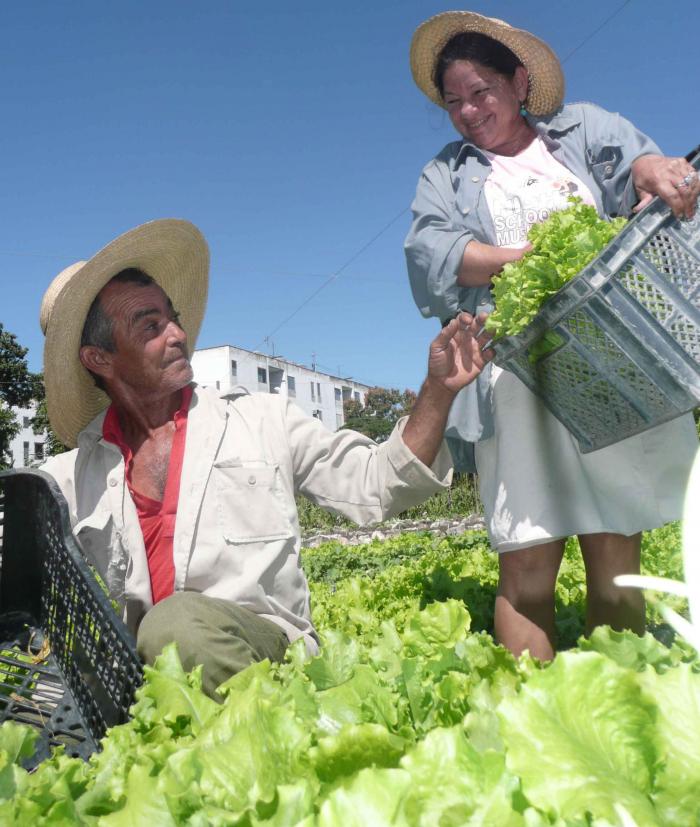
Photo: Dilbert Reyes Rodríguez
In a congratulatory letter, Army General Raul Castro Ruz greeted the members of the Urban, Suburban and Family Agriculture Movement, on the occasion of the 34th anniversary “since we together promoted the incipient experience of growing vegetables in beds enriched with organic fertilizers”.
The leader of the Cuban Revolution recounted how “what was an exception in very few places, was gradually extended throughout the country, until reaching more than 12,640 hectares that today make up the productive base” of that Movement.
Remembering how distant it may seem “that moment at the end of the 1980s when we indicated the need to develop and generalize this method of cultivation”, he stated that “undoubtedly, times have changed, but the need to produce food remains intact”, and emphasized these last two years, when the world has experienced one of the worst health crises. “COVID-19 has brought everything to a halt and has put millennial inequalities under the spotlight”.
He emphasized how, “in the midst of that gale, our country, besieged as never before by the United States, has no other option but to move forward by its own forces”, and affirmed that “in that battle you play an essential role, you, faithful promoters of the sovereignty that comes from the countryside and effort”.
He described as undeniable the progress of this popular movement. “The 1,300,000 tons reached today in its different productive modalities speaks of how much has been achieved, but also of the potential we still have,” he argued, and then asked: “How much more could we achieve if all the available areas in cities, communities, plots and yards were exploited, or if those that are sown were used more intensively?
“Finding the answers to these questions is the best help we can give to our people. That people who have been able to overcome these hard times and who will once again emerge victorious,” he assured, before ratifying his confidence in the Movement “to achieve the longed-for, and above all indispensable, food security.”
————————————————————————————–
(No English subtitles, but watch it anyway. It’s three minutes long.)
The three battles of 2021

The three battles of 2021
 By Agustín Lage Dávila
By Agustín Lage Dávila
December 28, 2021
Translated and edited by Walter Lippmann for CubaNews.
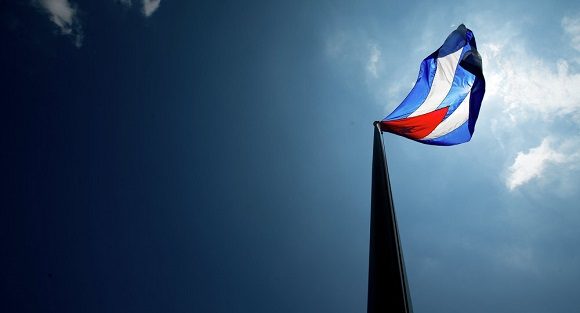
Photo: AP
This (No. 25) is the last note of 2021 and it is unavoidable to use it to summarize the message of what we appreciate has been essential in this difficult but also glorious year.
Cubans, each one from his or her position, with his or her ideas and values, but essentially all of us, have been involved in three great battles that will decide our future:
The control of the COVID epidemic.
The confrontation of the media and cultural aggression against our project of society.
Economic development, even in the context of the blockade.
These posed enormous threats to us: the first one threatened our health, the second one, our thinking, the third one, our material sustenance. The three together threatened our Nation.
In the first two we won, unquestionably. We must consolidate them and project them into the future, because they can continue, but they are essentially victories. In the third one, we managed to resist, which is no small thing, and it is the indispensable step to win, but the great victory still requires a lot of effort and intelligence.
The control of the epidemic of COVID-19 was achieved this year with biotechnology, science, the strength, and the experience and universality of our health system, and the educated participation of the people and their institutions. It validated the fertility of the scientific development strategy implemented by the Revolution for decades, and the importance of the connections between science and production that were built since the founding moments of the Scientific Pole, under Fidel’s leadership.
It validated the concept that health cannot be merchandise, and that the budgeted or entrepreneurial institutions on which health services depend have to be the socialist property of all the people. This is not only for moral reasons (which is the main thing) but also for reasons of efficiency. This battle will leave experiences for the improvement and development of both actors, industry and the health system, which we must apply immediately because the global pandemic context will continue in 2022.
The media and cultural aggression, with which, especially this year, an attempt was made to divide the people and erode their collective capacity to respond to the challenges of the moment, was defeated. Its implementation and financing (we know well by whom), in combination with the reinforcement of the blockade, precisely at a time when we were facing a dangerous epidemic, will go down in history as one of the greatest political immoralities of this century. It will be remembered in the gallery of shame, together with the Weyler reconcentration, the Nazi holocaust, the nuclear bombing, the Vietnam war, the support to the dictatorships of the South American cone, the South African apartheid and the murders of teachers by counterrevolutionary gangs in Cuba. History will not absolve its articulators.
The media and cultural aggression against Cuba is a war of thought. We defeated it, as Martí wanted “with thought”. The encouragement of violence, the promotion of selfish appetites, the distrust in the future of the country, and the dissemination of intellectual superficialities, crashed against the wall of Cuban culture, now solidified by six decades of massive and free access to education. They gambled on finding many influential fools in Cuba, and it turned out that there were very few.
This battle also leaves us experiences for the improvement and development of political and cultural work, which must be well analyzed because this episode of 2021 is part of an historical dispute of more than two centuries.
The third battle, that of economic development, has not yet been won. And it would be superficial to attempt a simplifying analysis in the space of 4 pages of a blog. But there are some things to say:
The first is that we have resisted the longest economic onslaught in world history (60 years), articulated by the largest economic and military power in world history; and we continue to resist 30 years after the collapse of the allies we had in Eastern Europe. And here we are, our people without hunger, without mafias, without housing evictions, with all their children in school, with our people’s government functioning under the socialist Constitution that we made and approved ourselves. This capacity dor resistance makes us proud, not only because of the resistance itself, but also because it indicates our capacity for development. Without sovereignty and national unity, no economic strategy, no matter how “technically brilliant” it might be, could work.
The second is that we are not frozen in old economic strategies, which worked at the time but have already fulfilled their historical role and exhausted their capacity to adapt to the changes in the world economy. We are in a moment of legislative and organizational creativity to adapt our development model to the new realities, without ceasing to be sovereign, equitable, educated and socialist.
The third is that the road to economic and social development must be traveled in a world context that is not the one that existed in the 1960s, when the Revolution made its first plans for economic take-off. We must now work in a globalized economy, which depends much more on the external economic balance, and on the capacity for international insertion, especially for small countries. It is also in an economy of rapidly changing technologies, which demands a higher dynamic of creation of diverse enterprises and connections between enterprises and scientific and educational institutions, as well as a higher dynamic of diversification of products and services of high added value.
All this requires managerial as well as technological creativity, and it is necessary to create the regulatory context that allows and stimulates it; and to train the young cadres who will play a leading role in it.
The fourth is that, with few natural resources and scarce domestic demand, and with a blockade that will continue (because our historical adversaries do not know how, nor can they do otherwise), our audacity to build material prosperity based on social justice and access to knowledge is essentially a cultural challenge. It will be culture, ethical, legal, scientific and technical, that determines our capacity to decouple economic growth from the expansion of inequalities, that expands the space of the possible, and establishes the speed of our progress.
The battles of this year 2021 prepare us to continue building the possible country that we Cubans want. Not the one that others want to impose on us, but the one we Cubans want.
 Agustín Lage Dávila is a prominent Cuban scientist. He was the Director of the Center of Molecular Immunology in Havana for 25 years. Advisor to the President of BioCubaFarma. He has received numerous national and international distinctions. He was Deputy to the National Assembly for several legislatures.
Agustín Lage Dávila is a prominent Cuban scientist. He was the Director of the Center of Molecular Immunology in Havana for 25 years. Advisor to the President of BioCubaFarma. He has received numerous national and international distinctions. He was Deputy to the National Assembly for several legislatures.
Desmond Tutu Dies at age 90

Desmond Tutu, South African archbishop and Nobel Peace Prize laureate, dies at the age of 90
For his fight against the brutal racist oppression of apartheid, Tutu is considered one of the key figures in South Africa’s contemporary history
Author:

Juventud Rebelde |digital@juventudrebelde.cu
Translated and edited by Walter Lippmann for CubaNews.
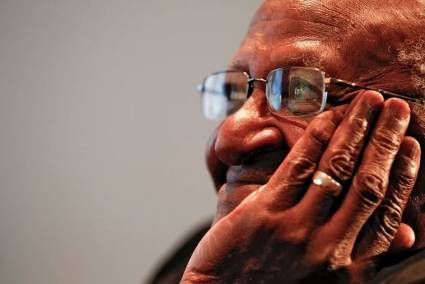
South African Archbishop Emeritus Desmond Tutu. Autor: EFE Publicado: 26/12/2021 | 09:36 am
This Sunday, at the age of 90, died South African Archbishop Emeritus Desmond Tutu, 1984 Nobel Peace Prize winner for his activism against the Apartheid racist segregation regime, in Cape Town, said in a statement issued by the South African government, the country’s president, Cyril Ramaphosa, who sent his condolences to the Tutu family.
“The death of Archbishop Emeritus Desmond Tutu is another chapter of loss in our nation’s farewell to a generation of outstanding South Africans who bequeathed us a liberated South Africa,” the president said in the text.
The president described Tutu as a “peerless patriot” and a “man of extraordinary intellect” who maintained his integrity in the fight against the “forces of apartheid.”
Even in a democracy, Ramaphosa stressed, Tutu maintained the “vigor” and “vigilance” of leadership to hold institutions accountable.
“On behalf of the Anglican Church of Southern Africa, the entire faith community and, dare I say, on behalf of millions (of people) across South Africa, Africa and the world, I send our deepest condolences to his wife, Nomalizo Leah, his son, Trevor Tamsanqa, and his daughters, Thandeka, Nontombi and Mpho,” Makgoba said in a statement.
The voice of the voiceless
“Apartheid, separate development or whatever it is called, is evil (…) It is anti-Christian and unbiblical. If anyone proves me otherwise, I will burn my bible and cease to be a Christian,” Tutu protested to apartheid officials in 1982.
For his tireless struggle, Tutu received the Nobel Peace Prize in 1984, two years before he became the first black head of the Anglican Archbishopric of Cape Town (southwest).
For his struggle against the brutal racist oppression of apartheid, Tutu is considered one of the key figures in contemporary South African history.
:quality(85)/cloudfront-us-east-1.images.arcpublishing.com/infobae/4QNT2SIPIYYZYBCKC7XHJHQDJ4.jpg)
At the World Conference Against Racism (WCAR), September 5, 2001. Photo: Reuters
He was at the helm until 1996, when apartheid was dismantled and South Africa became a democracy led by Mandela.
As president, Madiba – Mandela’s local nickname, who described the archbishop as “the voice of the voiceless” – gave Tutu the difficult task of chairing the Truth and Reconciliation Commission, a body charged with bringing to light the atrocities committed during apartheid.
:quality(85)/cloudfront-us-east-1.images.arcpublishing.com/infobae/QOTNWOB6UVDA5G73FFEL5VNE7Q.jpg)
Desmond Tutu with Mandela. Photo taken from the Internet
Tutu and Mandela, in fact, had resided on the same street in Soweto, which is today one of Johannesburg’s major tourist attractions, to the pride of South Africans, who boast that no other country has a street with two Nobel Peace Laureates.
His career has been marked by a constant defense of human rights, something that led him to dissociate himself on numerous occasions from the church hierarchy to openly defend positions such as gay rights or euthanasia.
In recent years he had stayed away from public life due to his advanced age and the health problems he had been suffering from for years, including prostate cancer.
His last public appearance had been in a few brief video images broadcast on his 90th birthday (last October 7), an anniversary that his foundation celebrated with a virtual conference in which participated, among others, the highest Tibetan spiritual leader, the Dalai Lama, the Mozambican activist and widow of Nelson Mandela Graça Machel or the former Irish president Mary Robinson.
(With information from EFE)
Freedom, Inc.

Freedom, Inc.
They have commodified the symbol of freedom so much that they don’t even know what it means anymore. But the worst thing is not that. The worst thing is that, consciously or unconsciously, this commodified counterrevolution has become one more “pillar” of socialism in Cuba. Because if the Revolution falls… what the hell are they going to live on?
Translated and edited by Walter Lippmann for CubaNews.
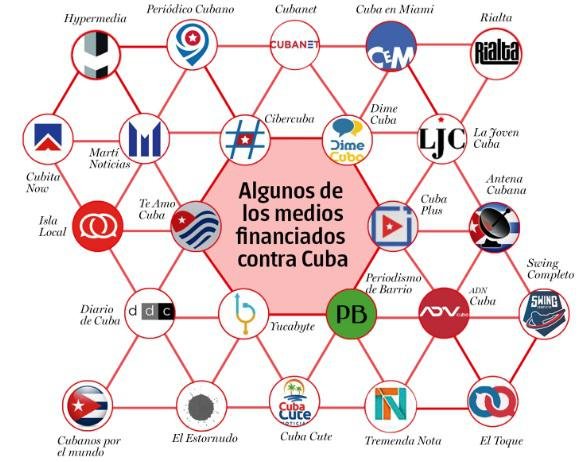
Image: Granma
A good capitalist finds everything a profitable business. It is the maxim of the successful bourgeois: make profit. With this liberal logic, let us not doubt it, human civilization has advanced considerably, although this advance has not been homogeneous. It cannot be questioned that leaving behind slavery or vassalage were substantial improvements for humanity as a whole, although there continued to exist (logically) oppressed and oppressors, people who had too little and people who had too much. And people who, even though they had too much, wanted even more.
The champions of capitalism have never ceased in their eagerness to accumulate property and wealth, wrapped in an ideological plot in which they feel themselves owners of land, resources, real estate, other people’s work… But finding as a limit not only the development of the productive forces themselves, but also nature and the real world itself, they sought to make money from symbols. Profiting from imaginaries was the new horizon of mercantile liberalism.
Today, when people in many countries celebrate Christmas, we cannot overlook the fact that December 25 is alleged to be the date of the birth of Jesus, a man who died crucified for advocating a different ideal for humanity and society, based on values such as mercy, austerity and love. However, the date has become an occasion to buy gifts, spend money on frivolities and reward consumerism. The symbolic-religious has become symbolic-mercantile.
It is not surprising then that the staunchest detractors of socialism practice the same, while promoting the capitalist system as the highest stage of social development. And finding that there is a solvent demand to finance their anti-communist crusade, they turned into profit what once, perhaps, was an honest, though misguided, commitment. It is hard to be honest when you pay obeisance to Don Money.
Battling for federal funds or for sums that are “laundered” through third parties, which may be foundations or other organizations, the champions of capitalist restoration in Cuba spare no effort to show themselves as “the best bet”. They have made the symbol of freedom their most profitable business.
According to the current, they mutate their discourse, to show themselves to be tougher or more peaceful. He who pays, rules: they only offer a service. With YouTube channels, where they talk about freedom, justice and the American way, while they sell you the best hamburger in Miami or the best beauty salon in Florida. Then there are sites that talk about national emancipation and transparency while they receive money from abroad through PayPal, with no declared patron. Then we have the counterrevolution has made preaching against the Cuban government a very attractive option from a financial point of view.
The same people who criticize so much the inequalities that we have not eradicated in our country, or who live by publishing any excess or luxury that a relative of a Cuban leader has, make thousands and even millions of dollars, with which they buy apartments, houses, travel around the world, are published in the most famous sites and media, receive prizes and gifts for the fact of continuing to breathe (before, during or after suffering the terrible Castro-communist dictatorship)…. Everything is possible if you belong to that financial and media corporation that has found an inexhaustible vein of gold in opposing the Revolution.
Meanwhile, there are useful fools who, poisoned by their hate speech, who continue contributing money, time and effort to a sterile cause. They are those who were deceived by a character who said he was going to come to Cuba from Spain, to free us from the “tyranny” of Diaz-Canel, with the infallible strategy of freezing the funds of the “dictatorship” abroad. Or those who believed that a certain playwright would fight to the last consequences because he believed in what he preached, and that he was not just another one of those who seek to facilitate a visa and a comfortable stay in Europe or the U.S. They are those who applaud, forgetful, any initiative, however puerile and inconsequential it may be.
The gesture is more important than anything else. That is why we are not alarmed when we read about the proposal to create a “Free Republic of Cuba”, nothing more and nothing less than at the naval base in Guantanamo, a territory illegally occupied by a foreign power. They have so commodified the symbol of freedom that they no longer even know what it means. But the worst thing is not that. The worst thing is that, consciously or unconsciously, this commodified counterrevolution has become one more “pillar” of socialism in Cuba. Because if the Revolution falls… what the hell are they going to live on?
“Excess enthusiasm when facing frustrations”

 PENSAMIENTO [THOUGHT]
PENSAMIENTO [THOUGHT]
“Excessive enthusiasm is a difficulty when facing frustrations.”
Hopefully, the empire will listen to its psychologists, and sometime understand that only new frustrations await it here, if it continues to trust advisors like Juan Gonzalez, Antony Blinken and the Miami haters.
Translated and edited by Walter Lippmann for CubaNews.
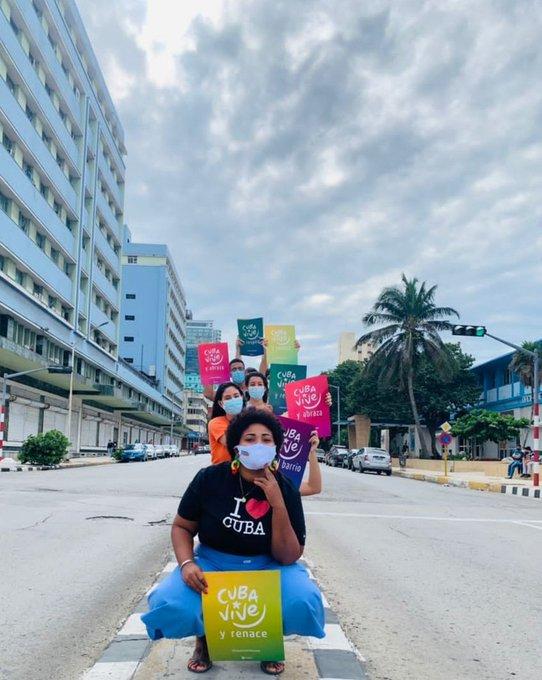
The United States has failed despite using all its unconventional warfare weapons against Cuba during the last two years. Photo: Taken from the Cuba Vive campaign.
Watching the events of the last few weeks in Cuba, it is easy to see the degree of frustration that must be gripping the U.S. power circles. They jumped, belly-first and with enthusiasm, into the waterless pool in which they found the intensive deployment against the island of all the weapons of unconventional warfare. During the last two years these included: economic, media and psychological warfare, terrorism, cyberwarfare, diplomatic pressure….
Those who for more than a decade have woven and financed in Cuba a dense network of media aimed at the most diverse sectors of society, collaborators in foreign correspondents, agents of change in the world, together with other forms of articulation, journalism and academia, leadership training courses, so-called thinking events in the United States, Latin America and Europe…, along with other forms of articulation, have had to see, I imagine not without sadness, how the current U.S. administration has thrown overboard all their patient work.
Juan Gonzalez, advisor for the Western Hemisphere of the National Security Council, and Antony Blinken, Secretary of State, violated, in their constant references to Cuba, what Niccolo Machiavelli suggested in the Prince: Never confuse desire with reality. The result is plain to see: the public exposure of U.S. interference in Cuba, the disarticulation of a good part of its internal subversion machinery and the discrediting before the Cuban people of those who have participated in it.
If one reviews the cable from the then-U.S. Interests Section in Havana, dated April 15, 2009, where its chief, Jonathan Farrar, described the failure of the traditional counterrevolution and suggests working with new actors such as bloggers, rappers and young visual artists, it is not difficult to understand how much the empire has lost in November 2021 in Cuba: at least 12 years of work!
But it is not triumphalism that should guide the work of Cuban revolutionaries after this 21st century Bay of Pigs. Washington lacks the humility to self-criticize its failures. Biden, even though he belongs to the same party, is not Kennedy, who had the courage to say to the mercenaries exchanged for compotes, when receiving them in a Miami stadium: “Victory has many fathers, defeat is an orphan”. Kennedy even attempted a secret rapprochement with Cuba that many believe is part of what cost him his life. And after the imperialist defeat at Playa Giron came the arch-terrorist Mongoose Plan, led at pencil point by the president’s brother, Robert Kennedy. Sobering, both Kennedy’s, John and Robert, were executed, not by the communism they fought so hard against, but by “lone assassins”, whose strings lead to the establishment they tried so hard to reform.
This time the decisive thing, again, has not been what our enemies have done, but what we have done. The key has been in the return to the people as the key factor, not only in processes such as the intervention of reality through the transformation of neighborhoods where numerous problems have accumulated. The key has been timely information about the war being waged against us, its characteristics and modes of operation. The latter -a missing element in our communicational work in previous years- assuming that a people capable of organizing itself in arms to defend its Revolution cannot be massively taught the weapons of the new war. We also underestimated the importance of broadly and deeply preparing all sectors of society for the not-so-new digital scenario, not only as critical receivers but, above all, as active participants.
It has been demonstrated, in recent months, that the media, state institutions, political and mass organizations, and the educational system weave a web that makes us invincible, if we are able to adapt it to the new circumstances and connect it with everyone who can be an ally in the anti-imperialist struggle, inside and outside our borders.
It’s a situation in which disinformation intoxication, through the growing use of digital social networks, serious economic shortages, shortages and consequent inflation, are joined by serious economic shortages, shortages and consequent inflation. It is necessary -in addition to the essential measures to stimulate the growth of the supply of goods and services, in addition to the successful control of the pandemic and the fact that blackouts are becoming less frequent, as is already happening, [to strengthen] ideological activity and, in particular, communications, as compañero Díaz-Canel has insisted, must be perceived by all revolutionaries as fundamental issues.
There are, to illustrate it, the material prosperity of Yugoslavia and Libya, razed to the ground with bombs after demonizing their governments, or more recently, the coups in countries like Bolivia and Nicaragua, with high economic performance indexes. Others believe that if we give institutional political space to the counterrevolution (multi-partyism it is called), the United States would begin to forgive us, but Antony Blinken’s response to the most recent multiparty elections in Venezuela should shake them out of their illusions: “it was not a free election”, he said, and, therefore, they will continue to support Juan Guaidó, who was indeed freely elected… by the Trump administration.
Not to rest in the battle for the truth, [we must] face decisively in confronting inequality where the disadvantages for the most humble have accumulated very significantly. [We must] create and enhance new economic, social, legal and cultural instruments against any inequality and discrimination, to intensely involve the people, and especially the youth, in the new and old fights. [That] has been the Fidelista response of the revolutionary leadership to the challenges of the present. And it has done so by listening to many, accepting criticism and speaking modestly, while working with intensity and transparency.
As the recently-deceased essayist, Juan Valdes Paz said in one of his last public appearances, the Cuban nation “does not have a solution vis-à-vis the US as we conceive it: independent, sovereign, self-determining”. But neither does Latin America and the world: independence, sovereignty and self-determination are obscene words in the empire’s dictionary.
The tribute paid by Washington and its allies to the last Human Rights Day was the announcement of the extradition of Julian Assange, to settle accounts with him for revealing, not State secrets, but war crimes and strategies of imperialist domination such as those exposed in the aforementioned cable, dated April 15, 2009.
It is the world upside down, where a Prometheus of our time must be tied to the rock so that the eagle devourer of entrails avenges, with exemplary punishment, the offense of exposing the Olympus of the dollar in its unspeakable crimes. Meanwhile, cardboard characters, in the tableau of dollars and technology paid by Wall Street, are applauded as heroes.
This is how the enthusiastic handlers of the N15 face their frustrations when there is no sovereignty to stop them. What would await the people of Cuba if they ever had the opportunity to impose on us what they understand by justice?
The social leaders shot and tortured en masse in our lands of America would be a colorful brushstroke for the hate-filled vengeance and bloodbath that the “military intervention” so often demanded from Miami in the last year would [actually] mean.
In the second season of the already old -and increasingly less outdated- Cuban series En silencio ha tenido que ser [It Had to Be in Silence], there is a scene in which the State Security agent, now a CIA prisoner, responds to a CIA psychologist, sent on a softening mission, with the advice she herself had given him during a training session when he and she were apparently on the same side: “Excessive enthusiasm is a difficulty when it comes to facing frustrations”.
Hopefully, the empire will listen to its psychologists, and at sometime [come to] understand that only new frustrations await it here, if it continues to rely on advisors like Juan Gonzalez, Antony Blinken and the Miami haters.
In the meantime, the signs are going in the opposite direction, so only the broadest culture and the most intense work can be our vaccines against an empire that, in its decadence, and worried about losing its hegemony at the global level, wants to gain a foothold in a territory it considers its backyard.
MININT news release on rescue operation

News release from the Ministry of the Interior
Surface units of the Border Guard Troops provided assistance to the castaways of a semi-sunken speedboat
Author:

Web Editor | digital@juventudrebelde.cu
Published: Saturday 11 December 2021 | 06:16:01 pm.
Translated and edited by Walter Lippmann for CubaNews.
At 21:30 hours on December 10, 2021, the Coast Guard Troops Maritime Search and Rescue Coordination Center received a distress call from a vessel in distress in the vicinity of the town of Santa Cruz del Norte, Mayabeque province.
Surface units of the Coast Guard Troops with the participation of a private boat, provided assistance to the castaways of a semi-sunken speedboat, with registration FL 7176SU of the United States, overloaded with people, in adverse hydrometeorological conditions with sea force three.
As a result of these actions, 2 minors, 7 women and 14 men were rescued, including two deceased.
Today, December 11, the search for possible missing persons continues, with the participation of naval units and other forces of the Ministry of the Interior, in the vicinity of the coast.
Once again, Cuban citizens are victims of the policy of the United States Government, which stimulates irregular emigration, which is taken advantage of by human traffickers, who, for profit, put the lives and deaths of human beings at risk.
Ministry of the Interior
MINREX on virtual “Democracy Summit”

A summit as unreal as the “democracy” it defends
Declaration by the Ministry of Foreign Affairs
Translated and edited by Walter Lippmann for CubaNews.
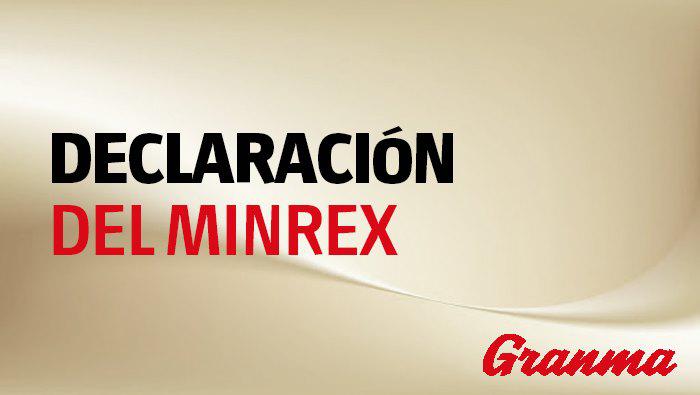
The virtual summit convened by the U.S. government on December 9-10, with pre-recorded speeches of the invited guests and a totally manipulated agenda, was a demagogic exercise, with no benefit for the international community and without any proposal to solve the most pressing problems of the world we share.
As a political artifice, it only served to show the growing isolation, alienation and loss of influence of the most powerful nation on the planet. In a practical sense, the only apparent result is the commitment of $400 million to the political subversion of sovereign states in blatant violation of international law.
A few hours have passed since the end of the event and few are able to explain or remember what happened there.
The U.S. government missed the opportunity to convene an inclusive meeting, promoting cooperation and the search for solutions to any of the problems that most urgently and seriously impact the lives of the majority of the world’s population.
It did not have the will to join efforts to face hunger, malnutrition, poverty and growing inequalities, unhealthy conditions, migratory problems, drug trafficking, organized and cross-border crime, the arms race or climate change. It did not even conceive the idea of convening world leaders to discuss and articulate a concerted response to the COVID-19 pandemic and other communicable diseases. The fact is that the United States cannot provide solutions as long as its policies are an essential part of such serious problems.
With great demagogy, IT called the unreal meeting under the theme of “democracy”, which it assumed as the defense of capitalism and applicable only to governments that do not challenge the hegemonic authority of the United States. Such a fabrication clearly shows the true divisive purpose and the interest in diverting world attention from the serious problems facing U.S. society and the U.S. political system today.
A country where money outweighs the popular will of its citizens, where the free sale and irresponsible use of lethal weapons, intervention and interference in the internal affairs of sovereign states is promoted, where racism is systemic and war is the most lucrative business, has nothing to teach the international community.
As Cuba has been warning, the U.S. government is leading a dangerous campaign aimed at creating an international schism, dividing the planet and punishing countries that defend progressive projects or do not accept the models imposed by the United States.
To try to impose a single acceptable recipe for a political system on all countries is, in itself, profoundly anti-democratic. It is contrary to the Proclamation of Latin America and the Caribbean as a Zone of Peace, signed in Havana by all the countries of our region, which establishes the commitment to fully respect the inalienable right of every State to choose its political, economic, social and cultural system, as an essential condition to ensure peaceful coexistence among nations.
This twisted vision is what leads them to act on the margins of the United Nations, where they suffer increasing isolation due to their repeated challenges to the principles of civilized coexistence, respect for multilateralism and the self-determination of peoples and sovereign equality among its Member States, concepts that today are unacceptable to the U.S. rulers.
More than 80 countries, including Cuba, were not invited, and this is not surprising, because we are a nation that for almost 63 years has successfully rejected the U.S. attempt to subjugate it and has effectively defended its inalienable right to self-determination. In a summit aimed at promoting capitalism, and the central and dominant role of the United States in its promotion, the presence of socialist Cuba should not be expected.
In the cooperation to find solutions to the serious problems of the world, the international community can always count on our support, on the constructive, active and supportive contribution of Cubans in the search for consensus, to unite wills, to enrich and benefit from diversity and to privilege what unites us instead of what separates us. The international trajectory of the last 60 years supports this affirmation.
The world demands peace, development, justice, solidarity, cooperation and mutual trust. It does not benefit from division, selectivity and unilateral impositions.
Caravanistas visit Denunciation Memorial

Members of Pastors for Peace caravan visit memorial in Cuba
The visitors learned historical facts about Washington’s aggressiveness against the Caribbean nation, and rejected that power’s interference in the island’s internal affairs.
Author:

Juventud Rebelde | digital@juventudrebelde.cu
Posted: Tuesday 16 November 2021 | 03:35:42 pm.
Translated and edited by Walter Lippmann for CubaNews.
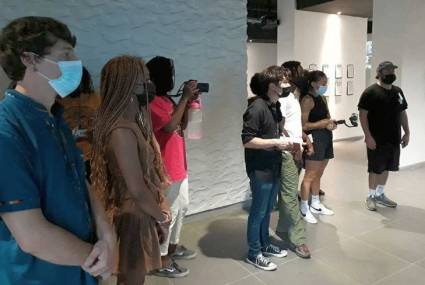
Members of Pastors for Peace caravan visit memorial. Autor: PL Publicado: 16/11/2021 | 03:34 pm
Members of the U.S. interfaith organization Pastors for Peace arrived today at the Denunciation Memorial , in this capital, as part of its program of activities in solidarity with Cuba.
The visitors learned historical facts about Washington’s aggressiveness against the Caribbean nation, and rejected the interference of that power in the internal affairs of the largest Antillean island. In declarations to local television, the caravanistas recognized Cuba as an example and ratified their support to the socialist project.
The day before, the activists arrived at the capital’s José Martí International Airport. Upon their arrival, the director of that group, Gail Walker, stated that the 75 visitors from 20 U.S. states joined the 31st edition of these initiatives to show the majority feeling of the U.S. people with respect to Cuba.
She pointed out that her companions are especially interested in learning about the achievements of this Antillean nation in confronting the COVID-19 pandemic, in the midst of the tightening of the economic, commercial and financial blockade and other aggressions by the U.S. government.
During their stay until November 26, the members of Pastors for Peace will carry out an intense agenda in the provinces of Havana and Matanzas (western Cuba), which includes meetings with women’s and workers’ organizations, and tours of educational institutions of historical and social interest, according to PL.
Subscribe to Blog via Email
| M | T | W | T | F | S | S |
|---|---|---|---|---|---|---|
| 1 | ||||||
| 2 | 3 | 4 | 5 | 6 | 7 | 8 |
| 9 | 10 | 11 | 12 | 13 | 14 | 15 |
| 16 | 17 | 18 | 19 | 20 | 21 | 22 |
| 23 | 24 | 25 | 26 | 27 | 28 | |


You must be logged in to post a comment.